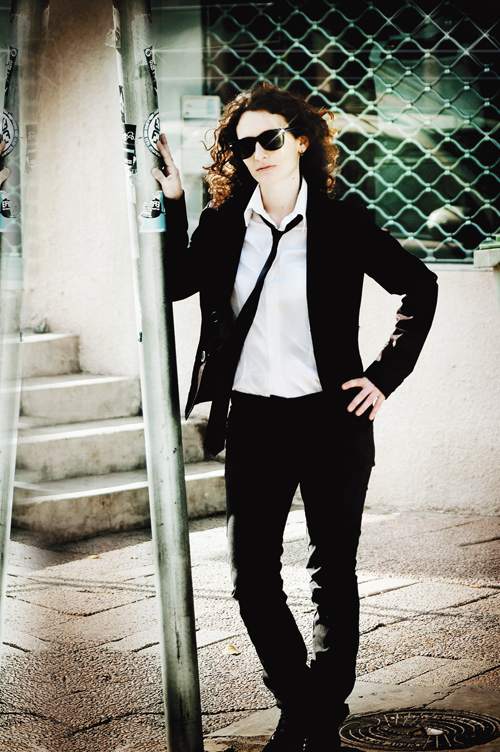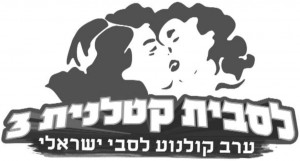
Anat Nir’s Brave New World

Tel Aviv activist views Israel as ‘a younger country with a younger [LGBT] community’
by David Goldberg • Photo by Grace Lemberger
Last month, Equality Forum presented Israel as its featured nation. And that’s not for nothing. A worldwide survey held by GayCities and American Airlines crowned Tel Aviv as the world’s top gay tourist destination.
OutSmart spoke with Anat Nir, co-creator of Tel Aviv Gay Vibe, co-creator of the Lethal Lesbian film festival, and head of the Israeli delegation to Equality Forum. She filled us in on “pinkwashing” the Israeli/Palestinian conflict, the power of positive PR, and what she has learned from American gay culture.
David Goldberg: So Equality Forum was a success?
Anat Nir: It was great. It was very interesting to talk about Israel, not only in the LGBT sense, but [in regards to] the conflict that we have in our country, which affects everything. I really am interested in all kinds of dialogue. Even though there were protests, they were intelligent and they provoked discussion. I don’t feel like I’m going anywhere in the world to preach to the choir. I was very happy that we had a variety of views. That way, we could make our views more substantial, and interact with people and change ideas. It was wonderful.
I’m so impressed with your attitude. Thanks to your efforts, Tel Aviv is known as the best gay city there is, and yet you still want to learn from other places.
It’s nice that you say that. It means our campaign is working. But our struggles are younger. [Israel is] a younger country with a younger community. Our human rights struggle started in 1975, when the rest of the world’s struggles started in the 1960s—so we are definitely behind in that matter. Also, we are a religious state, so we do have an aggressive law situation. It could all change in one day because we don’t have a constitution. It is very interesting to learn about LGBT activism and models from the U.S. Everywhere we go is bigger than Tel Aviv, or Haifa, or Be’er Sheva. It’s really interesting to go abroad and see how things work here.
What I love about Tel Aviv is that, because it is so young, it really feels like anyone’s city. Anyone can start their own party. In the States, it’s a little more corporate and strict. Do you see Israel heading in that direction?
It’s so nice that you feel this way about the scene. I feel the same way. I’m not sure where it’s going to go. We’re going to have our own development. You said before that if you go to a club in America, it’s older. That’s a good thing. In Israel, there is a very big disrespect for the elder community. If you are above 30, your life must end. I am being a cynic, but that is how it feels. It is nice for me to see in San Francisco an older community. It’s nice that people still feel lively and they go out. I know we are the nightlife leader. Not just the gay nightlife, but all kinds of nightlife. I’m sure we’ll stay that way, but I’m sure our community is going to get older and wiser and more mainstream. Soon, we’ll have more gay families and different models and alternative families. That’s becoming an issue that we’re dealing with, and that’s interesting and intriguing. We’re not all about partying anymore.
Current events in nearby Arab countries are being viewed in international press as a boon to their gay communities. Do you buy it?
I do believe that. I think that eventually gays will succeed everywhere in the world, including in Arab countries. It is very important for us to be involved and to support LGBTs all over the world, and it’s very painful to think that in some places being LGBT is illegal. When people get killed, or it is illegal, it is something we need to protest about. But I don’t think I am branding our country. I am branding the LGBT experience of our country, which exists, and I am just exposing it to the world. But I am not doing it to support the policy of the country. I am exposing something I know and I have experienced all my life and I’m enthused about and don’t think is in contradiction with the image of Israel. I see it as another image. I’m not doing it to cover up other images we have. We are also very religious, we also have a conflict, we also have a water situation, we also have great nature, we have the desert—we have so many things that are great and awful, like any country.
I’ve always said that I feel safest as a gay person in Tel Aviv more than anywhere else. I’ve walked around in a tank top in some of the worst neighborhoods, and not felt too threatened.
It’s great that you can go to the Tachanah Merkazit [the central bus station of Tel Aviv] and feel completely safe, and you are probably completely safe, and you feel different than you feel in any other place. It’s a very safe place for LGBT people. Tel Aviv gives you a sense of a safe environment, and that is so important for an LGBT tourist. I went to study in Costa Rica for a year, in a U.N.-mandated university. The first thing I wanted to know was how I would be accepted as a gay person. I think even if we go somewhere for a weekend, we really want to know that.

What is going on with Lethal Lesbian, the film festival you created and produce?
It’s going great. We’re having a fifth festival, which is so wonderful. The time has passed so quickly. Actually, Lethal Lesbian is the only Israeli film festival in Israel. All the rest of the film festivals we have, whether they are here or not, are international. The International Women’s Festival, Haifa, Jerusalem—all of them are international. We are the only one that has only Israeli films. Last year we really became more mainstream. We have such a quirky name, and it’s been such an uneasy struggle to get funds and to get the municipality to support us…. [But we now] have this very queer project supported by the state and the municipality, and it’s very important to shift minds and to shift intellects.
David Goldberg also writes about Blake Hayes—the afternoon-drive on-air personality on Houston’s Mix 96.5—in this issue of OutSmart magazine.











Comments